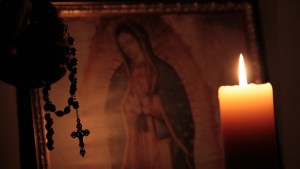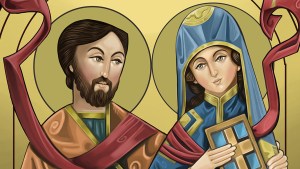What is the origin of marriage?
We know that God Himself is the author of matrimony.
According to the Church, the exclusive union of one man and one woman is a “natural law” written in human nature by the Creator from the beginning, and common to humankind at every time, in every people and culture.
The Book of Genesis already contains the fundamental characteristics of marriage.
Marriage is exclusive and indissoluble:
Therefore a man leaves his father and his mother and clings to his wife, and they become one flesh.
Genesis 2:24
Matrimony is oriented towards procreation:
Be fruitful and multiply, and fill the earth. Genesis 1:28
As with everything, the relationship between man and woman has also been corrupted by original sin.
Jesus has healed it, not only by bringing marriage back to its original meaning, but by instituting it as a sacrament.
It happens during the famous account of the Wedding at Cana with the transformation of water in wine.
With the grace of Christ, the “water” of the spouses becomes transformed into “new wine”: the love of the spouses is thus sanctified.
The sacrament of matrimony is based on the free and reciprocal consent of the spouses to live a faithful and indissoluble love and openness to life.
This is true to the point that for centuries the Church tolerated secret marriages based only on the consent of the spouses, before two witnesses.
The Council of Trent then established the canonical form of that consent, which today goes like this:
I take you to be my husband/wife.
I promise to be true to you
in good times and in bad,
in sickness and in health.
I will love you and honor you
all the days
of my life.
Marriage is the only sacrament in which the minister is not an ordained minister, but the spouses themselves, at the moment when they exchange consent before God, the Church, and the community.
The priest accepts their consent and gives the Church’s blessing.
Tradition manifests the new status of the spouses with a blessing and the exchange of the wedding rings.
An ancient symbol of commitment and fidelity, the wedding rings become a sign of “consecrated life,” and are also an authentic sacramental that protects those who wear them from the temptations and attacks of the evil one against marriage.
The valid celebration of matrimony creates a perpetual and exclusive bond between the spouses which not even the Church has the power to dissolve.
Therefore what God has joined together, let no one separate.
Matthew 19:6
In extraordinary cases, the Church allows for the physical separation of the spouses but they remain husband and wife before the Church.
The Church does not recognize any eventual new unions as valid. If one occurs, the couple may not receive the Eucharist, but they may still participate at Mass and in the life of the Christian community. In fact, they are encouraged to do so, and the community is called to welcome and accompany these people with charity.
The annulment of a marriage is only possible when, after a deep investigation, the Church recognizes a defect in the prerequisites for the sacrament. In this case, the matrimony can be declared null, which means, it never really happened.
Unity, indissolubility, and openness to life are essentials for marriage and reflect the fidelity of God to his Alliance, and of Christ to the Church.
It’s not an unachievable goal but a path made possible by the power of Christ’s grace.


